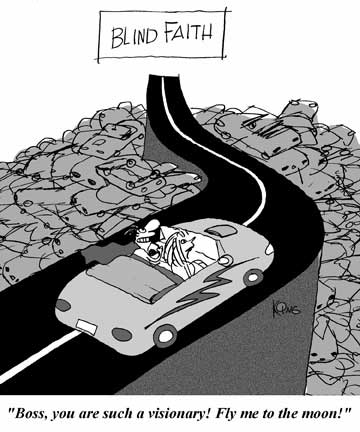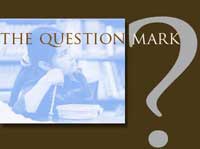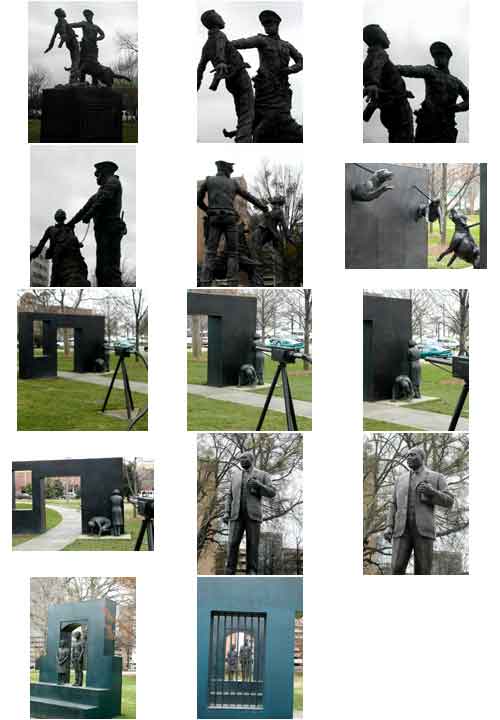Questioning Authority
by Jamie McKenzie (about author)

Questioning authority is as American as apple pie. It is also basic to civic life in Australia, New Zealand and many other democratic nations of the world, but schools do not always place much emphasis on this "habit of mind" when teaching social studies to the young.
 There are many times when this kind of questioning will prove important in the lives of our students. There will be occasions to challenge the idea of a boss. There will be times to challenge the advice of a doctor. Sometimes they will doubt and challenge the policies of national and local leaders, standing up at meetings or working with groups to oppose bad policies. There are many times when this kind of questioning will prove important in the lives of our students. There will be occasions to challenge the idea of a boss. There will be times to challenge the advice of a doctor. Sometimes they will doubt and challenge the policies of national and local leaders, standing up at meetings or working with groups to oppose bad policies.
If we raise the young with too much respect for authority, they can become victims of bad advice and damaging behaviors.
 Two recent books by John Boyne make this point eloquently. The Boy in the Striped Pajamas (2006) tells the story of an eight year old who is the son of the commandant of the concentration camp at Auschwitz. The book shows how human life and culture erode when a society and the individuals within it surrender to totalitarian leaders and evil philosophies. Reading this novel or watching the film based on the book should provoke serious thought by middle school and high school students. Order The Boy in the Striped Pajamas from Amazon Two recent books by John Boyne make this point eloquently. The Boy in the Striped Pajamas (2006) tells the story of an eight year old who is the son of the commandant of the concentration camp at Auschwitz. The book shows how human life and culture erode when a society and the individuals within it surrender to totalitarian leaders and evil philosophies. Reading this novel or watching the film based on the book should provoke serious thought by middle school and high school students. Order The Boy in the Striped Pajamas from Amazon
His most recent book, A History of Loneliness - A Novel, is better suited for adult readers as it explores the life of an Irish priest who witnesses the collapse of the church as allegations of widespread sexual abuse by priests surface and are sadly proven to be all too true. It is a very sad story of abuse by authority that went too long unchallenged and unquestioned. Order A History of Loneliness from Amazon
Questions for students to ponder:
- When is it wise to challenge government policies?
- Which actions are responsible when expressing dissent?
- Which actions are unacceptable?
- Should dissent ever extend to the point of "civil disobedience?"
- Is it ever ok to break laws and go to jail?
These are the types of questions faced by civil rights demonstrators in Birmingham, Alabama in the 1960s as they challenged segregation laws. Many young Americans faced police, police dogs, fire hoses and jail in order to question a system of racist laws.
The above photographs were captured in Birmingham, Alabama while visiting
the Birmingham Civil Rights Institute.
This important skill has been addressed in previous articles:
Most of us will be fortunate enough to avoid jail, beatings and lynchings. But most of us will face situations when someone in a position of authority makes a demand that is unreasonable. It may be our boss. It may be a teacher or a priest. Each time this happens we must ask if we will comply or resist. We must consider the costs of compliance and the price of dissent.
Dissent may cost us our jobs. Dissent may mean severe punishment by the teacher or the priest. Will each of us have the courage to stand tall in our own lives like Dr. Martin Luther King? like Rosa Parks? (MLK Poem - Standing Tall)
Teaching Strategies
Teachers can develop this skill by immersing students in literature that puts characters into ethically challenging dilemmas.
"What would you do, if you were (name of character)?"
During World War II, those who hid or protected Jewish people from the Nazis could be executed along with all family members for this crime. One book for grades 3-6 that explores this issue is Greater Than Angels by Carol Matas, a novel that tells the true story of a village in France.
Based on the true story of a French village that banded together to protect the Jews during WWII, this unforgettable tale honours the contagious goodness that permeated one corner of a region otherwise enveloped in evil, and celebrates the courage of all those who put their lives at risk to save others.
Order Greater Than Angels from Amazon
Prior to the Civil War in the USA, it was a crime to help escaping slaves.
"What would you do, if you were (name of character)?"
Scholastic published an article, "Myths of the Underground Railroad," that claims very few whites actually supported or helped with the Underground Railroad or runaway slaves.
Students must consider whether they would have risked prison or death to save the victims of injustice. Or would they have looked away and stayed safe? What will they do if faced with similar choices in their future?
Of course, as John Boyne makes clear, silence and inaction in the face of injustice is a form of complicity and may be a crime against humanity in itself. Looking the other way when the Nazis take your neighbors away is a sin. Pretending you did not know is a sin. Taking no action against totalitarian regimes and wrong-minded policies is a sin. Silence and passivity in the face of oppression is a sin.
Tom Paxton wrote a powerful song "We didn't know!" that brings this challenge into focus with three issues from the past: 1) the extermination of the Jewish people; 2) the racist laws of the South and 3) atrocities committed during the Vietnam War.
[Cho:]
We didn't know at all,
We didn't see a thing.
You can't hold us to blame,
What could we do?
It was a terrible shame,
But we can't bear the blame.
Oh no, not us, we didn't know. |

Photo: WWW.CZESTOCHOWAJEWS.ORG |
Today with the controversy over police killing citizens, students must ask what stance they might take. When police are cleared of charges despite evidence of wrongdoing, should the students remain silent? Or should they march? What research should they do before deciding to take a public stance? What do we mean by "responsible dissent?" When is dissent damaging and wrong minded?
There are no simple answers to these questions. Students will almost always be handling ambiguity, complexity and dilemma.
© Jamie McKenzie
Copyright Policy: Materials published in The Question Mark may be duplicated in hard copy format if unchanged in format and content for educational, nonprofit school district and university use only and may also be sent from person to person by email. This copyright statement must be included. All other uses, transmissions and duplications are prohibited unless permission is granted expressly. Showing these pages remotely through frames is not permitted.
FNO Press is applying for formal copyright registration for articles.
Unauthorized abridgements are illegal. |


 There are many times when this kind of questioning will prove important in the lives of our students. There will be occasions to challenge the idea of a boss. There will be times to challenge the advice of a doctor. Sometimes they will doubt and challenge the policies of national and local leaders, standing up at meetings or working with groups to oppose bad policies.
There are many times when this kind of questioning will prove important in the lives of our students. There will be occasions to challenge the idea of a boss. There will be times to challenge the advice of a doctor. Sometimes they will doubt and challenge the policies of national and local leaders, standing up at meetings or working with groups to oppose bad policies. Two recent books by John Boyne make this point eloquently. The Boy in the Striped Pajamas (2006) tells the story of an eight year old who is the son of the commandant of the concentration camp at Auschwitz. The book shows how human life and culture erode when a society and the individuals within it surrender to totalitarian leaders and evil philosophies. Reading this novel or watching the film based on the book should provoke serious thought by middle school and high school students.
Two recent books by John Boyne make this point eloquently. The Boy in the Striped Pajamas (2006) tells the story of an eight year old who is the son of the commandant of the concentration camp at Auschwitz. The book shows how human life and culture erode when a society and the individuals within it surrender to totalitarian leaders and evil philosophies. Reading this novel or watching the film based on the book should provoke serious thought by middle school and high school students. 
